The electric vehicle (EV) landscape is rapidly evolving, with significant advancements in driver-assistance systems capturing the attention of investors and automakers alike. BYD, the prominent Chinese electric car manufacturer, is positioning itself at the forefront of this transformation as it commits to enhancing its offerings in autonomous driving technologies. This article explores the implications of BYD’s recent initiatives, the expected ripple effects on its supply chain, and the broader automotive market dynamics in response to these advancements.
In a bold move, BYD recently unveiled its new driver-assistance system, named “Dipilot,” capable of integrating advanced technologies across a diverse lineup of vehicles, including budget-friendly models priced under 70,000 yuan (approximately $9,600). This announcement has not only propelled BYD’s shares to multi-year peaks but has also sparked considerable optimism among analysts regarding the potential benefits for companies supplying components for these innovative systems.
BYD’s foray into driver assistance is not just an incremental upgrade; it symbolizes a strategic pivot towards distinguishing its product offerings in a competitive market dominated by well-established players like Tesla. With increasing consumer demand for enhanced safety features and smart technologies, automakers are under pressure to accelerate their own technological advancements. BYD’s integration of DeepSeek’s artificial intelligence further enhances functionality, making it a formidable contender in autonomous driving solutions.
Positive investor sentiment surrounding BYD’s new initiatives is evident, as highlighted by analysts’ assessments. Firms such as Nomura foresee a robust growth trajectory for suppliers tied to BYD’s driver-assist system. Analysts emphasize that these advancements not only bolster BYD’s market position but also catalyze demand for smart driving components across the entire automotive sector.
As competing manufacturers strive to remain relevant, there is a palpable sense of urgency to invest in similar technologies. The competition can lead to increased capital inflow into smart mobility solutions and component suppliers, creating a thriving ecosystem for tech-driven automotive innovations.
A closer examination of the supply chain reveals that BYD’s advancements will significantly benefit various technology partners, including BYD Electronics, Horizon Robotics, and Hesai Tech. These companies play pivotal roles in the production of essential components that enable advanced driver-assistance capabilities.
Horizon Robotics, in particular, is gaining recognition as a leading chipset supplier. Analysts at Goldman Sachs have been bullish on Horizon Robotics, raising their price targets based on expectations of substantial growth tied to their Journey 6 chipset. This innovative technology is anticipated to account for a noteworthy percentage of the company’s revenue within a few years, underlining the critical intersection between BYD’s ambitions and the suppliers’ trajectories.
Hesai, a should-be contender in the lidar sphere, has also caused market waves as it navigates regulatory challenges in the U.S. Despite facing scrutiny, analysts remain optimistic about its product lines, advocating for its potential as the demand for sophisticated sensor technologies mounts. Its strategic partnerships with BYD further position it favorably amid soaring interest in smart driving systems.
The backdrop of this automotive revolution is underscored by geopolitical dynamics, particularly China’s push for technological self-reliance and the impact of U.S. restrictions. The rise of nationalistic policies has fueled a burgeoning ecosystem of homegrown technologies, allowing companies like BYD to thrive domestically while positioning themselves for international competition.
BYD’s focus on the Chinese market exemplifies this trend, as it seeks to capitalize on its market’s growth potential while simultaneously navigating a highly competitive environment. This strategy includes adapting to regional regulations and consumer preferences, ensuring that its offerings resonate with local buyers.
BYD’s commitment to integrating advanced driver-assistance technologies signals a broader trend that may redefine the automotive landscape. As other manufacturers ramp up their own technological advancements in response to BYD’s moves, the automotive market stands on the precipice of significant change. The push for smart driving features will not only create opportunities for component suppliers but also foster a healthier, more innovative industry.
BYD exemplifies how strategic technological investments can pay dividends and reshape market dynamics. As the demand for electric vehicles and smart automation continues to surge, observers can expect an exciting and competitive era ahead in the automotive sector, driven primarily by innovation and technological prowess. BYD, along with its component ecosystem, is poised to play a central role in the future of transportation, highlighting the interconnectivity and relevance of each player in this rapidly advancing field.

